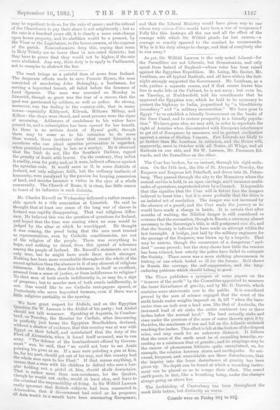The week brings us a painful item of news from
Ireland. The desperate efforts made to save Francis Hynes, the man convicted of murdering John Doloughty, a herdsman, for serving a boycotted tenant, all failed before the firmness of Lord Spencer. The man was executed on Monday in Limerick, though so great was the fear of a rescue, that the gaol was garrisoned by soldiers, as well as police. So strong, moreover, was the feeling in the country-side, that in many towns—especially Kildysart, Kilrush, Miltown Milbay, and Kilkee—the shops were closed, and most persons wore the signs of mourning. Addresses of condolence to his widow have poured in, and a subscription has been opened for her benefit. As there is no serious doubt of Hynes' guilt, though there may be some as to his intention to do more than wound, these incidents show that round Limerick a murderer who can plead agrarian provocation is regarded, when punished according to law, as a martyr. Be it observed that the Irish do not like the Southern Italians, regard the penalty of death with horror. On the contrary, they inflict it readily, even for petty and, as it were, indirect offences against the agrarian code. It would seem as if, in some districts of Ireland, not only religious faith, but the ordinary instincts of humanity, were paralysed by the passion for keeping possession of land, and murder becomes a virtue in the eyes of a whole community. The Church of Rome, it is clear, has little reason to boast of its influence in such districts.






























 Previous page
Previous page